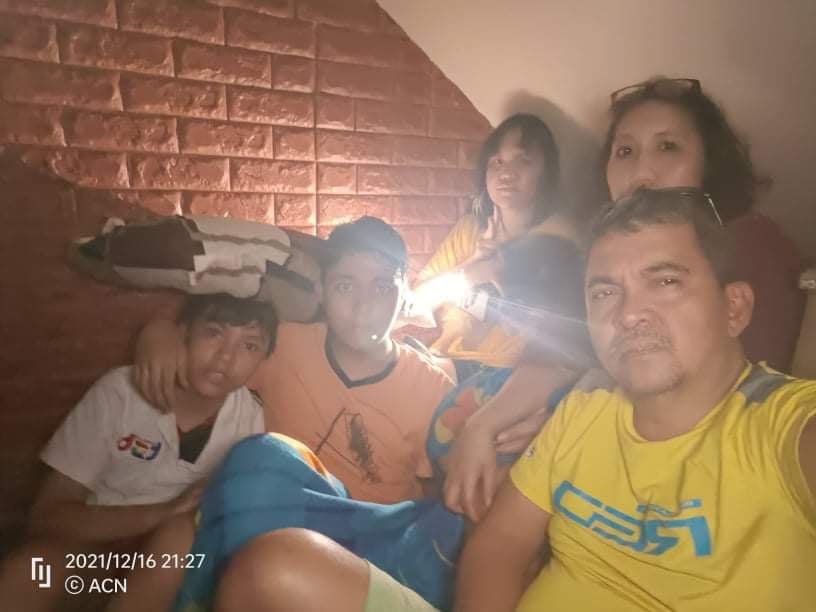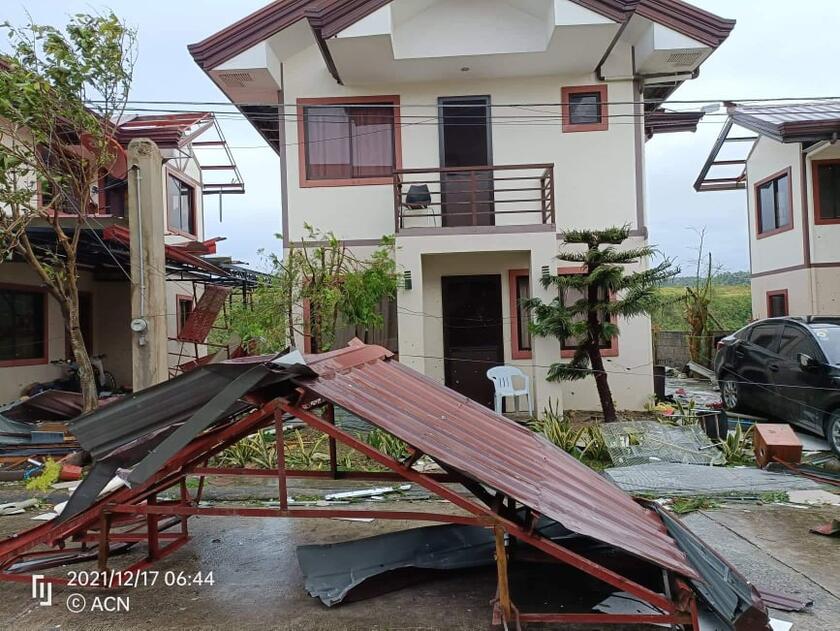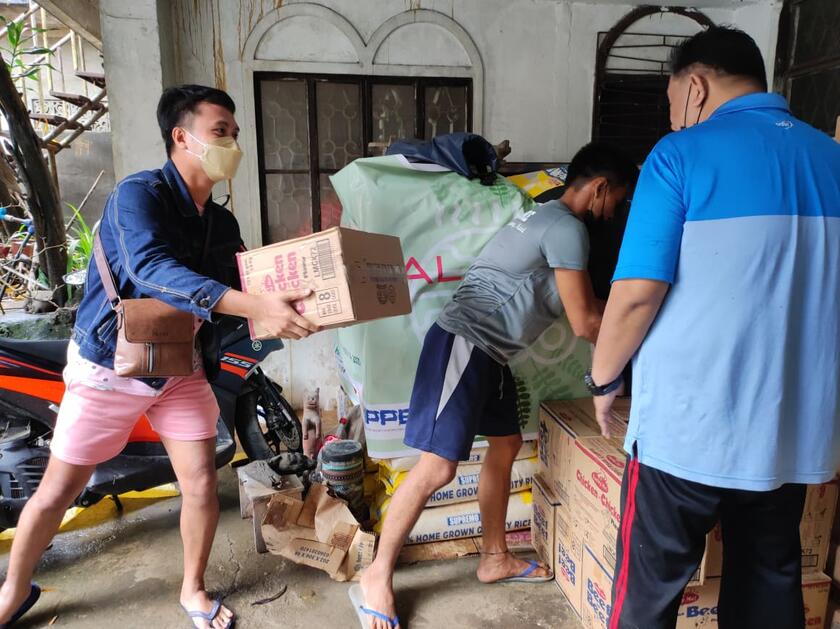Johanniter in the Philippines: "It was the longest night of our lives"
Shortly before Christmas, Typhoon RAI hit the Philippines and left a trail of devastation in the Johanniter project area. Our staff members were also personally affected. Here, our colleague Arnie Najera tells us impressively how he experienced the storm with his family and how he did his job as the best he could despite being affected.

I had weathered many storms in my life, some angrier than others. I'd seen my share of the mercilessness of nature from behind concrete walls and television screens. I've heard of stories of homes being obliterated and lives rendered to rubble within the night. Until that night, they were always just stories. Sad stories to be heard of the day after, its distant effects felt only in short power outages and slower internet speeds.
In December 16, 2021, there were no radios or television screens to hide behind. Not even a mobile signal strong enough to call for help for when the worst would happen. As it was, we barely had a roof to hide under for most of the night.
When a house becomes an ark
A few hours earlier, it might have been comical. Five people sealed tightly in a house with all our pets and animals for a night. We thought our place was our own little ark. Come the storm, we realized, that wasn't quite the fair comparison. Noah's ark lasted forty days and nights of merciless rain. This one started falling apart, barely two hours in.
Perhaps it was arrogant of us to think we'd walk away from a Category 5 typhoon like Odette (International name RAI) with little more than rattling windows and leaky ceilings. Nine years ago, we had survived Yolanda (International name HAIYAN) just fine, tucked away in another part of the city, watching the rain behind the windows. Thirty years ago, we survived Ruping (International name Typhoon MIKE, which carried a sustained winds of 280kph, which hit Cebu squarely in 1990). Odette was just another storm to weather, storm warning signals be damned.
Nightmarish symphony of a storm

It was 8:40 PM when the first ceilings crashed down. The kids were screaming inside as the wind kept on howling just outside our windows. Eventually Odette took those too, windows out of window panes, roofs right out of their frames. The smell of rain and debris became indistinguishable from one another. The violent thrashing of our roof (or what was left of it) joined its neighbors' in a nightmarish symphony.
Like some tragic commercial, we hid under the stairs for the rest of the night. Five people, two dogs, eight puppies, and a bird - all cramped in the tiny space under the stairs. It was the safest place in the ark, yet no one slept soundly that night. Not when the smell of debris wafted in from upstairs every so often. Not when the windows rattled so violently we trembled with them. For every crash outside, we wondered what it could have been this time. Another piece of our roof? Another piece of the neighbor's? The car? The entire night was just placing bets we hoped wouldn't win. For a family that hadn't been to church in the last year, it was a night of prayer. That was all we could do. Pray and wonder.
"Climate change Dad, climate change!"

It was the longest night, but eventually, we did see the morning - and the chaos RAI/Odette had left behind. It was the wreckage of movies. Like someone had come and plucked out the set of every apocalypse film and set it down here, in our neighborhood. Wires draped the street. Glass and other debris littered the ground. Someone's entire gable roof sat squarely in our driveway, where the car would have been. We were astounded to further see the havoc that Typhoon RAI brought to this small community. As I went out and surveyed the vicinity the more I discovered the extent of damage, electric poles toppled down, trees - some decades old - all reduced to rubbles.
My wife and I mused "typhoons were not this strong some 30 or 40 years ago, Cebu given its location, seldom experience this kind of destruction"... to which my kids responded in chorus "climate change Dad, climate change".
Support by Johanniter
The days after the disaster were no joke either. Aside from having to tend with a wrecked roof and ceiling, the family now faced the problem of water and provisions supplies. I tried going out in the city but I was stopped few meters from our village because the road ahead was unpassable. But we had no food and water! We have little cash but can't buy as people are advised to stay inside their homes. The whole day of Dec 17 we lived on bread and little water.
After that, the clearing up began. Johanniter made possible a quick advance on our salary so that we could carry out and pay for the most important repairs. I was also granted a loan of 5,200 euros that I can slowly pay off over the next 12 months. I am grateful for this and it has lifted a burden off my shoulders.
Nevertheless, Christmas was not a celebration, but mourning. We were crying. It was the loneliest Christmas for the family but we explained to our kids, it's better than one less family member. We should be thankful we still are complete. But yes our Christmas and New Year were both dark - literally and figuratively. Literally because power was not back until just this week.
Helping as much as possible

Because of the strength and the path it traversed, I knew immediately that RAI would have an impact on one of our ongoing projects in Mindanao. I also thought of that immediately the morning after. What about the partner and the communities they are working on? I tried to make contact as soon as possible, but the signal was difficult.
After informing my colleague Nenen that we had survived, I was informed by her in the following days that emergency measures were being prepared with our partner in Mindanao. I helped with this and at the same time tried to take care of my family's needs. I tried to keep the family intact and sane, to convince them that I needed to support a partner organisation to provide emergency relief in devastated communities. This was difficult. I was struggling with our own resources and with overcoming the trauma we had just experienced. That is why I tried to support as much as I can, inspite of.
One big lesson we realized from this whole experience - in a disaster such as this, before, during and after, preparation is everything.
Preventing suffering before it happens
Disaster risk reduction is an important part of our work.